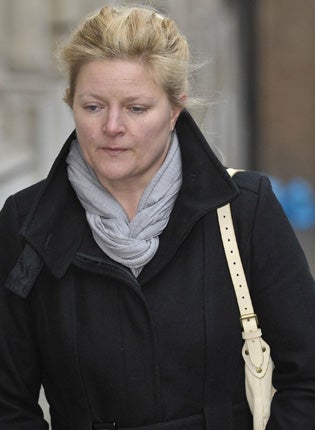Nurse 'sought perverted control' over residents

A former care home manager accused of murdering two elderly women may have had a "bizarre and perverted" desire to "control the terminal destiny" of residents in her care, a court heard today.
Rachel Baker, 44, was hooked on class A drugs when she allegedly murdered Francis Hay, 85, and Lucy Cox, 97, with a lethal dose of medication, Bristol Crown Court heard.
Baker, a registered nurse, fed her addiction by stealing prescribed and controlled drugs from residents at Parkfields Residential Care Home, in Butleigh, Somerset.
The mother-of-one, of Boundary Way, Glastonbury, Somerset, who appeared in court dressed in a grey knee-length cardigan, denies two counts of murder.
The jury previously heard she admitted eight counts of possessing class A and C drugs, and one count of perverting the course of justice.
Continuing his opening address, prosecutor David Fisher said there was no need to prove a motive.
But he added: "Rachel Baker was, by her own admission, regularly taking prescribed drugs which must have had a substantial effect on her character and conduct.
"She, for a variety of bizarre and perverted reasons, may have had a desire to control the terminal destiny of some of her residents."
Baker became hooked on such drugs as diamorphine, which is similar to heroin, pethidine and Diazepam in 2005, following treatment for migraines.
The court heard there were at least eight residents from whom Baker accepts she diverted drugs for her own use, including the allegedly murdered Mrs Hay and Mrs Cox.
The jury was told Baker made repeated requests for diamorphine prescriptions to treat Mrs Hay in the weeks leading up to her death on November 22, 2006.
Mr Fisher said care assistant Kathy Slade, who worked with Baker, overheard her boss ask Mrs Hay if she wanted to "end it all" two days before she died.
The court heard Mrs Hay was being looked after by Ms Slade in her room - number 14 on the first floor.
Mr Fisher said: "Francis Hay was in a wheelchair, watching TV and laughing at the TV."
The court heard that Ms Slade and another carer dressed Mrs Hay and left her to watch television.
Mr Fisher went on: "Kathy Slade was in the corridor close to Francis Hay's room. She noticed the door to room 14 was shut, which in itself was unusual as it was always kept ajar.
"She heard a voice coming from within the room. She stepped up about three feet away from the door.
"She then heard Rachel Baker say "Francis, shall we end it all now?'. To which Francis Hay replied 'Oh no, darling. I'm all right, darling' and then Rachel Baker said 'Shall we do it now?'
"In disbelief, Kathy Slade ran from the corridor and attempted to block it from her mind.
"However, when she returned to her room, she observed a drastic change in Francis Hay's condition."
The court heard Mrs Hay was less animated, her head was lying back and her pupils were "little dots in the centre of her eyes".
Mrs Hay's condition did not improve and she died on November 22, 2006.
Experts who later examined her records concluded Mrs Hay's given cause of death - acute ischemic bowel - was not the likely cause of death.
Furthermore, "circumstantial evidence" suggested increased doses of opiates administered to Mrs Hay in the weeks and days preceding her death could have caused her death.
The court heard Mrs Cox died on January 1, 2007, and a post-mortem examination revealed she had a large dose of painkiller Tramadol in her system.
Mr Fisher told the court: "The stark fact is Lucy Cox had never been prescribed Tramadol. It's almost as simple as that."
Ms Slade was caring for Mrs Cox on December 31, 2006, when Baker arrived in her room - number 11 on the first floor.
"Rachel Baker entered Lucy Cox's room and, upon seeing Kathy Slade, who was on duty that evening, Rachel Baker jumped," Mr Fisher said.
"She (Baker) walked over to Lucy Cox and said 'She's still here then. I thought she would have gone by now.'
"She then told Kathy Slade to go and Rachel Baker would stay with Lucy Cox."
The court heard, after about 10 minutes, Baker left room 11 but remained at the care home.
The post-mortem examination also revealed Mrs Cox had not been receiving the appropriate medication she had been prescribed to treat her deteriorating condition.
Mr Fisher added experts concluded there was "no justification" for the administration of Tramadol.
Concluding his opening speech, Mr Fisher told the jury: "You will have to consider what effect the consumption of drugs may have had on Rachel Baker's behaviour and her attitude to those two ladies.
"You will need to bear in mind that it appears that the only person within the home who injected drugs into residents was her and that may have a significant bearing on how the drugs came to be within the bodies of those two ladies who died."
Yesterday, the court heard more than 5,000 units of medication prescribed to residents of Parkfields were unaccounted for between late 2005 and mid-2006.
The trial continues and is expected to run until the end of March.
Bookmark popover
Removed from bookmarks